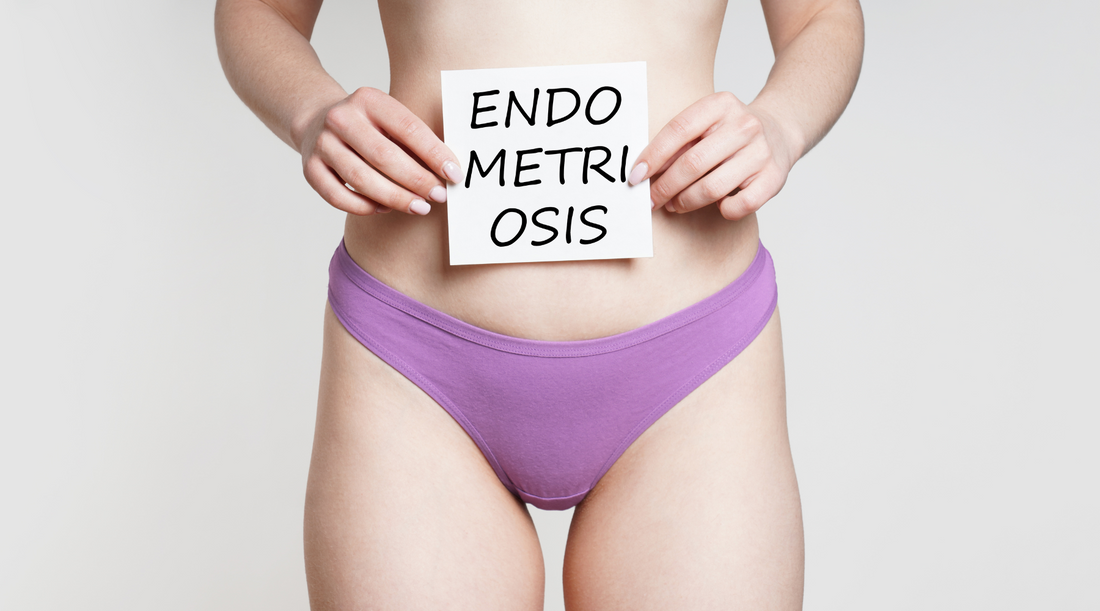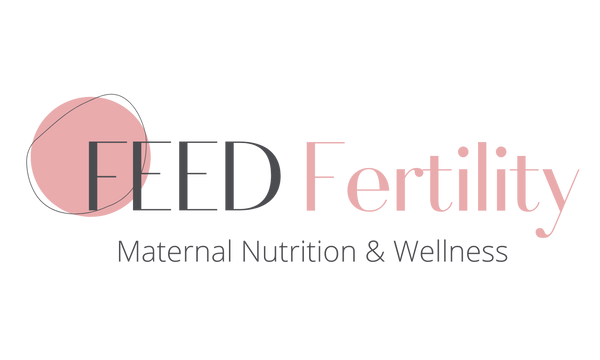
Endometriosis & Fertility
In high school, I had a friend with really bad cramps. The was so intense she missed class every single month. It wasn’t until years later – after countless doctor’s visits and tests – that she was diagnosed with endometriosis.
Endometriosis affects 1 in 10 women of reproductive age, which, considering that many cases are never diagnosed, and others are asymptomatic, is a very high number. Endometriosis is one of the leading causes of female infertility and is something that often comes up in my practice.
Today we cover the basics, of what endometriosis is, how it affects fertility, and what are some options for for women living with this condition. In future posts, we'll explore dietary strategies, lifestyle guidelines, supportive supplements and more natural solutions for helping to manage symptoms and address root imbalances.

What is Endometriosis
Endometriosis occurs when cells similar to the endometrium (lining of the uterus) are formed outside of the uterus. These misplaced cells (aka ‘lesions’) are most commonly found inside and on the ovaries, on the fallopian tubes, on or behind the lower part of the uterus, on the uterosacral ligaments (the bands of tissue holding the uterus in place), on the bowel and bladder, and/or on the lining of the pelvis (the peritoneum). In rare cases, they can develop outside of the pelvic cavity and can show up anywhere in the body.
Regardless of their location, these lesions grow and bleed each month during menstruation, just like the endometrium. This causes inflammation, which in turn causes scar tissue and adhesions (bands of fibrous tissue that stick organs together). The unpleasant result can be pain during menstruation, ovulation, defecation, intercourse and for some, chronic pelvic pain. It can also affect energy levels, mood, digestion, and fertility.
Causes of Endometriosis
The exact causes of endometriosis are unclear, however, there are theories. One theory is retrograde menstruation - when some of the endometrium flows backward through the fallopian tubes and into the abdomen rather than leaving the body during menstruation. Another is genetics since it has been shown to be more common to be affected by endometriosis if a close female member of your family (like a parent or sibling) has it too. It is also theorized that a compromised/low immune system may be to blame, where the immune system is not strong enough to get rid of the misplaced tissues. A connected theory is lymphatic spread, the idea that some cells of the misplaced tissue can travel around the body through the lymph.
While the exact cause seems to be a mystery in the medical community, there are many correlations between endometriosis and other imbalances and symptoms. For example, many women with endometriosis also suffer from histamine intolerance. One of the main drivers of Endometriosis is excess oestrogen, which not only makes symptoms worse, but cab also stimulate mast cells to release histamine and down-regulate an enzyme (DAO) that helps to break down histamine. This creates a vicious circle as histamine stimulates the ovaries to make more oestrogen, which stimulates mast cells to release more histamine, etc...
Another strong correlation is between endometriosis and digestive imbalances. Studies report that gastrointestinal symptoms affect up to 90% of women with endometriosis. For example, there is a high incidence of infection with candida in women with endometriosis - some studies report as high as 70% of women with diagnosed endometriosis also have candida overgrowth. Not surprisingly, many women who successfully treat their Candida overgrowths report a decrease in endometriosis symptoms. There is also strong evidence to suggest many women with endometriosis have some degree of intestinal permeability, more commonly known as "leaky gut"—a condition in which particles (such as bacteria, toxins or undigested food particles) can pass through the intestinal wall and into the bloodstream.

How Endometriosis Affects Fertility
The exact nature of the relationship between infertility and endometriosis is unclear, but 30% to 50% of women with endometriosis will experience infertility. Endometriosis can influence fertility in several ways, including distorted anatomy of the pelvis, inflammation of the pelvic structures, adhesions, altered immune system functioning, scarred fallopian tubes, hormone changes, altered egg quality, and impaired implantation of an embryo.
The likeliness that endometriosis will have on fertility greatly usually depends on what stage (or degree of severity) an individual has it - from stage 1 (minimal) to stage 4 (severe). An estimated 70% of women with mild to moderate endometriosis will get pregnant without treatment. Fertility is most affected in women who have stage 4, heavy scarring, blocked fallopian tubes, and damaged ovaries.

Diagnosis & Treatments
Diagnosing endometriosis can be difficult because it is often mistaken for other conditions with similar symptoms. Diagnosis usually involves an ultrasound and/or MRI scan, but even that may be inconclusive as it will not show smaller lesions. A conclusive diagnosis may require a laparoscopy – a surgical procedure that allows a surgeon to access the inside of the abdomen and pelvis using a laparoscope.
There is currently no known cure for endometriosis, but there are treatment options to help manage symptoms. Medical treatments usually include surgery (to remove legions), hormones (to suppress menstrual period) and/or painkillers. During a laparoscopy, a surgeon may remove scar tissue and some of the growth. Birth control is commonly recommended, especially for those that have a side effect of cessation or decrease in menstrual flow, such as the depo shot, continual low dose progesterone pill, or hormonal IUDs. However, if someone is TTC, hormone therapies will not be an option, leaving only painkillers and holistic options like diet and lifestyle changes.

Natural Solutions for Endometriosis
While diet cannot cure or prevent endometriosis, it can help to manage symptoms and its severity. Dietary protocols have been shown to minimize inflammation in the body, thus by following an anti-inflammatory diet, it may be possible to minimize the likeliness that new scar tissue and adhesions will form. The focus of such a diet includes adding more anti-inflammatory foods, reducing the number of pro-inflammatory foods, and increasing awareness of what your body reacts to.
Another way that diet can help has to do with hormone balance. Estradiol is a type of estrogen that regulates how uterine tissue grows. Research shows that women with endometriosis have higher levels of estradiol, a condition referred to as estrogen dominance. High levels of Estradiol can affect the endometrial tissue outside of the uterus and lead to more inflammation and pain. The right dietary protocol can help to reduce estrogen dominance in the body, thus helping to manage symptoms of endometriosis.
Finally, while endometriosis has not been officially termed an autoimmune condition, its connection with the immune system is well documented. Also, (as mentioned above), it is even theorized that low immune function can be a cause of endometriosis. In that regard, diet can play another key role. Specific nutrients help to nourish and support the immune system, thus helping improve immune functions.
In addition to diet, lifestyle factors also play an important role, the most important of which seems to be stress. Some studies have shown how periods of high stress (especially chronic stress) can make endometriosis symptoms worse. Having a solid stress management self-care protocol, therefore, seems to be the cornerstone of an endometriosis management protocol. In addition to stress, factors like physical activity, sleep, and mindfulness practice, all seem to play a part.
Stay tuned to next week, as we continue to explore endometriosis and its connection to fertility. In The Endometriosis Diet we discuss specific dietary protocols that have show to help women with endometriosis manage their symptoms, and improve their fertility potential.
